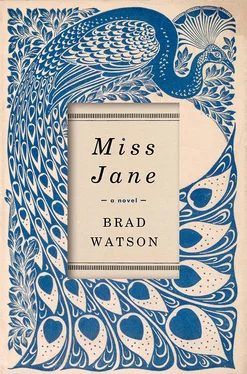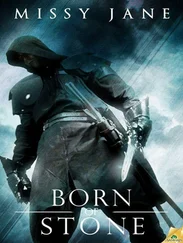Her disposition is generally bright, if also somewhat prodigiously contemplative. A fairly solitary and independent little sprite. I have driven up, looked around, finally asked, and no one will know where she is nor seem too concerned about the not knowing. And then she will appear, as if from thin air, behind me, standing there looking up at me and smiling. We talk. It’s rare that anything she says prompts me to request a thorough examination.
In any case, I figure we are out of the woods in terms of any potentially dangerous complications. I will keep a close watch when it comes near time for puberty, of course, although — again — if it is indeed what you believe it to be, I shouldn’t have to worry about that.
It was a disappointment to her, the attempt to attend our local school. I don’t know exactly what happened, and it didn’t seem the teasing was excessive. She was melancholy for a while after, but seemed to recover entirely by spring. Still, I cannot help but think that she hides a deep emotional burden inside her little child’s chest. I don’t see how she could escape it. My god, Ellis, the child pretty much picked up reading in just three months there. Such a waste.
I am considering taking it on myself to bring her up there for a thorough examination by Young, if you could help me arrange it. She is plenty old enough now to undergo surgery, if it were advisable. I know you think my own examinations and communications are probably sufficient to diagnose as you have: that this is not an operable condition, at this point in time, and that most likely even sphincter construction is unlikely. But, if the girl and her family are willing, I would rest easier knowing for sure, after examination by an experienced specialist in the field. If not your people, then at least let one of the urologists in Memphis take a look. It is only a little over 200 miles from here, as opposed to the near 1,000 to you.
In any case, I will be in touch about the potential visit/examination. Please continue to send any news of developments, but I will try to make this examination happen as soon as possible. The girl is such a delight, truly, that I hate to think ahead and imagine her living a long life of isolation and shame, which is sure to come on her if there is nothing to be done about her condition once she is older.
My best to Mary Kate, when you see her. Tell her the one she should have married wishes you all well. I do so miss Lett. Her family keeps fresh flowers at her grave in town. She is in their plot, as you know. As for me, burn and scatter the ashes in my woods if I go first. It’s in the will.
Yrs,
Ed
PRETENDING TO BEGRUDGE it but seeming to enjoy it once they’d get started, Grace sometimes helped Jane with her reading in the evenings, bringing home books from the school library, and corrected her handwriting efforts. The teachers had let her borrow the books, knowing she had a little sister at home who wanted to learn. There was the Bible in the house, of course, but it was incomprehensible. No one read from it, much less aloud. The pictures of paintings inside it were interesting. More helpful was the Sears, Roebuck catalog, with its pictures of the items described there for sale. There was always a new one in the house, and an older one in the outhouse. Sometimes she would take the newer catalog to her father in the evenings and ask him to read her the description of something in there for sale. It was all a kind of schooling, anyway.
When Dr. Thompson learned that she wanted for reading material, he began bringing books when he visited.
“I don’t know why I didn’t think to, before,” he said. “Lett was a reader. I am, too, of course, but she read novels, made-up stories. I like some of them but it’s the rare one I like a lot. I thought I’d bring some by, you see which ones you like, we’ll start to get an idea of which ones I ought to give you.”
“You don’t have to give them to me for good.”
He shrugged, said, “I don’t care much about hanging on to books after I’ve read them. Most of them, anyway. Better to give them away to others who might want to read.”
“Well. Thank you.” Then she stood on her tiptoes and kissed him on his bristly cheek. The doctor stood there a long moment, something like a look of amused wonder on his face. Then he smiled to himself, got into his car, and drove off.
Inside, Jane looked at the books he’d given her. One had her own name in the title, Jane Eyre . It seemed a little bit dense, but would be interesting to her later on. Another was The Adventures of Tom Sawyer . It was an old battered copy and about boys, so she thought it might have been his own book and he was just tired of reading it. She set it aside, too. The third one was old, also, but not so worn. It was a slim little book with a faded red cover and the title on the spine: A Simple Heart , by Gustave Flaubert, an odd name. She set to reading it that night, and couldn’t stop. She finished by candlelight. She was in tears over poor Félicité’s sad but beautiful life, her broken heart and her loneliness, her love for her mistress’s children, and fascinated by the way she began to lose her mind, and filled with wonder at the spirit of her beloved parrot hovering over her at her death.
She lay awake late into the night, the candle finally guttering out in its holder, and in the dim light left in the room from a bit of moon she passed into sleep without even feeling it coming, and dreamed heavily, and though she couldn’t remember anything particular when she woke the next morning, she remembered that the dreams had been kind of heartbreaking, and thought that she may have wept in her sleep. The odd thing was that she didn’t feel sad in their aftermath. She felt something like a lightened joy. She felt the damp of her tears on the pillow, and turned it over so that her mother would not see.
SHE BEGAN TO HELP her mother out in the kitchen, preparing meals. She wasn’t allowed to cook anything yet but she was shown things, so that she would gradually learn that and be able to take over from Grace — and maybe even her mother — after Grace left home. No one knew when that would be, although when she was angry Grace was threatening to leave any minute. She made no secret of her desire to get off the farm.
As her mother and Grace began early preparations for supper, Jane helped shell peas and butterbeans, rinsing them and leaving them in water for their mother to boil all morning with salt pork while Jane sucked her thumb, which was sore from prying apart the butterbeans’ tough pods. If there was to be a chicken fried, her mother would walk calmly among the nervous yard birds, casual as if just strolling through, and then would snatch one by the head and give it a quick twirl to snap its neck. Then she would dip it in scalding water, pluck and gut it, chop off its feathered head and hard yellow feet.
Jane took the bucket in which her mother had tossed the head, feet, and guts down to the hog pen and tossed them straight onto the bare earth there, where after a momentary silence for comprehension the hogs, sows, and shoats set upon it, bawling, brawling, squealing from lust and the pain of swift and intense battle. Yet another, if negative, reason to dislike the eating of their meat.
Back at the house her mother had carried the plucked and headless hen back to the porch and pumped a little water to wash it, then carried it inside, cut it to frying pieces, dipped it in egg and milk, dredged it in flour, and dropped it piece by piece into the broad pan of hot lard on the stove, and set it piece by browned piece aside to drain on a sheet of newspaper on the counter.
Jane would be set to peeling potatoes to boil and mash for the meal, or washing greens in a small tub on the back porch. Looking out over the yard, she would recall the remarkably casual, vivid slaughter, each arcing flop of the hen’s unceremonious exit from this world, each rise and quick chopping blow of the little hatchet through its neck into the oak stump, and somehow feel apart or invisible, a strange presence locked in her own consciousness, like no one else’s in the world, apart from all others, her fingers tightening in recollection of this or that casually violent action, and it sent a current into her spine up into the base of her neck, the tingling of it coming out her eyes in invisible little needles of light indistinguishable from the light of the gathering day.
Читать дальше












